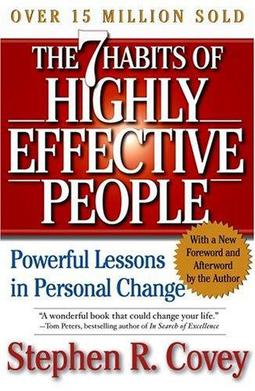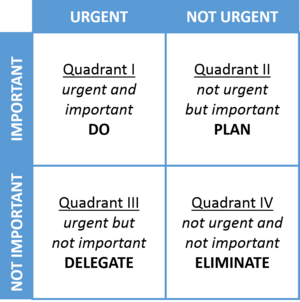The 7 Habits of Highly Effective People facts for kids
 |
|
| Author | Stephen R. Covey |
|---|---|
| Country | USA |
| Language | English |
| Subject | Self-help |
| Publisher | Free Press |
|
Publication date
|
1989 |
| Media type | Print (Hardcover, Paperback) |
| Pages | 381 |
| ISBN | 0-7432-6951-9 |
| OCLC | 56413718 |
| 158 22 | |
| LC Class | BF637.S8 C68 2004 |
| Followed by | The 8th Habit: From Effectiveness to Greatness |
The 7 Habits of Highly Effective People is a famous self-help book. It was written by Stephen R. Covey and first came out in 1989. The book teaches you how to be more successful in life. It helps you reach your goals by following certain "true north" principles. These principles are like universal rules that always work.
Covey says being "effective" means getting good results. But it also means taking care of what helps you get those results. He uses the story of the goose that laid the golden eggs to explain this. You want the golden eggs (results), but you also need to care for the goose (what produces the results).
This book has sold over 40 million copies around the world. It became very popular because it offers a different way to think about success. Covey believes that real success comes from your inner character. It's not just about looking good or using quick tricks. He says that if you live by timeless principles, you will see good results.
Contents
The 7 Habits: A Guide to Success
Stephen Covey talks about how people see things differently. He calls this a paradigm shift. It means two people can look at the same thing and have different ideas about it. Understanding this helps us work better with others.
Covey also introduces the idea of a maturity continuum. This describes three stages of growing up and becoming more mature. These stages are dependence, independence, and interdependence.
Dependence means you need others to get what you need. We all start life as babies, needing others to care for us. You might depend on others for ideas or for their approval. Dependence is like saying, "You take care of me."
Independence means you can do things mostly by yourself. You are free from needing too much help from others. Independence is like saying, "I can do it." Many people think this is the highest goal. But it's not the final step to living a truly effective life.
The third and highest level is interdependence. This means working together with others. We live in a world where we often need each other. Interdependence is important for good leaders and team players. It's also key for happy families and successful groups. Interdependence is like saying, "We can work together."—Stephen Covey, The 7 habits of highly effective people (1998)
The first three habits help you move from being dependent to being independent. The next three habits help you become interdependent. The last habit helps you keep improving all the time. Each habit has its own section in the book.
Moving Towards Independence
The first three habits are about becoming a master of yourself. They help you become more independent.
Habit 1: Be Proactive
Being proactive means taking charge of your own life. It's about choosing how you react to things that happen. You decide to respond in a positive way and make things better. Covey says that between something happening and your reaction, you have the power to choose. Nothing can truly hurt you without your permission. This habit teaches you to focus on what you can control.
Habit 2: Begin with the End in Mind
This habit is about knowing what you want for your future. It's like creating a personal plan for your life. When you know your goals, you can work and plan to reach them. Covey says you should act based on your principles. Always think about what you want to achieve. Ask yourself: "Am I who I want to be right now?" And "How do I want to be remembered?"
Covey explains that everything is created twice. First, you create it in your mind. Then, you create it in real life. Before you do something, think about it carefully. Make sure it's what you want and that the results will be good.
Habit 3: Put First Things First

This habit teaches you to focus on what is truly important. It's about managing your time and energy wisely. Covey uses a helpful way to sort tasks:
- Quadrant I: Urgent and Important (Do these first!) – These are things like important deadlines or emergencies.
- Quadrant II: Not Urgent but Important (Plan for these!) – These are things that help you grow in the long run, like studying for a big test or planning a project.
- Quadrant III: Urgent but Not Important (Try to delegate or avoid!) – These are distractions with deadlines, like answering every text right away.
- Quadrant IV: Not Urgent and Not Important (Eliminate these!) – These are just time-wasters, like endless scrolling on social media.
Covey says that after finishing urgent and important tasks, you should spend most of your time on things that are important but not urgent. This helps you plan for the future and avoid last-minute stress. This habit is about becoming a leader in your own life. It means doing what you say you will do.
Working Well with Others
The next three habits are about working together with other people. This is called interdependence.
Habit 4: Think Win-Win
This habit is about finding solutions that benefit everyone involved. When you work with others, try to find a "win" for everyone. This is better in the long run than only one person getting their way. Thinking win-win is not just about being nice. It's a way of interacting with people that builds trust and helps everyone succeed.
Habit 5: Seek First to Understand, Then to Be Understood
This habit teaches you to really listen to people. Try to understand what they are saying and how they feel. When you truly listen, people will be more likely to listen to you. This creates a positive atmosphere where you can solve problems together.
Covey explains that there are three parts to getting your message across:
- Credibility (Ethos): This is about how much people trust you.
- Empathy (Pathos): This is about understanding and connecting with other people's feelings.
- Logic (Logos): This is about the facts and reasons behind what you say.
Covey says that credibility and empathy are more important than just having good logic.
Habit 6: Synergize
Synergizing means working together as a team. When people combine their strengths, they can achieve amazing things. Things that no one person could have done alone. This habit encourages positive teamwork to reach bigger goals.
Always Getting Better
The last habit is about always improving yourself and your relationships.
Habit 7: Sharpen the Saw
This habit is about taking care of yourself. It means balancing and renewing your body, mind, and spirit. This helps you have a healthy and effective life for a long time. Covey suggests:
- Physical renewal: Exercise and eat well.
- Mental renewal: Read good books and keep learning.
- Spiritual renewal: Spend time reflecting and helping others.
Covey talks about an "upward spiral" model. This means that by learning, committing, and doing, you can keep growing and improving. Each time you practice these habits, you will understand them better. This path of continuous learning helps you gain freedom, wisdom, and power in your life.
The Abundance Mindset
Stephen Covey also came up with the idea of an abundance mindset. This is a way of thinking where you believe there are enough resources and successes for everyone. People with this mindset are happy to share with others. They don't feel threatened when someone else succeeds.
This is different from a scarcity mindset. A scarcity mindset makes people think that if someone else wins, they lose. People with an abundance mindset don't believe in "zero-sum games." They celebrate the success of others. Covey says this mindset comes from having good self-worth and feeling secure. It leads to sharing good things like profits, recognition, and responsibility.
Formats
You can find The 7 Habits of Highly Effective People as a book or an audiobook. There was also a VHS video version.
Other Versions for Kids and Teens
Stephen Covey's son, Sean Covey, has written special versions of the book. These are made for younger readers.
- The 7 Habits of Highly Effective Teens simplifies the habits for teenagers. It makes them easier to understand and use.
- The 6 Most Important Decisions You Will Ever Make: A Guide for Teens gives advice on key choices teens face.
- The 7 Habits of Happy Kids is a children's book. It uses stories with animal characters to teach the 7 habits to even younger children.
See also
 In Spanish: Los siete hábitos de la gente altamente efectiva para niños
In Spanish: Los siete hábitos de la gente altamente efectiva para niños

